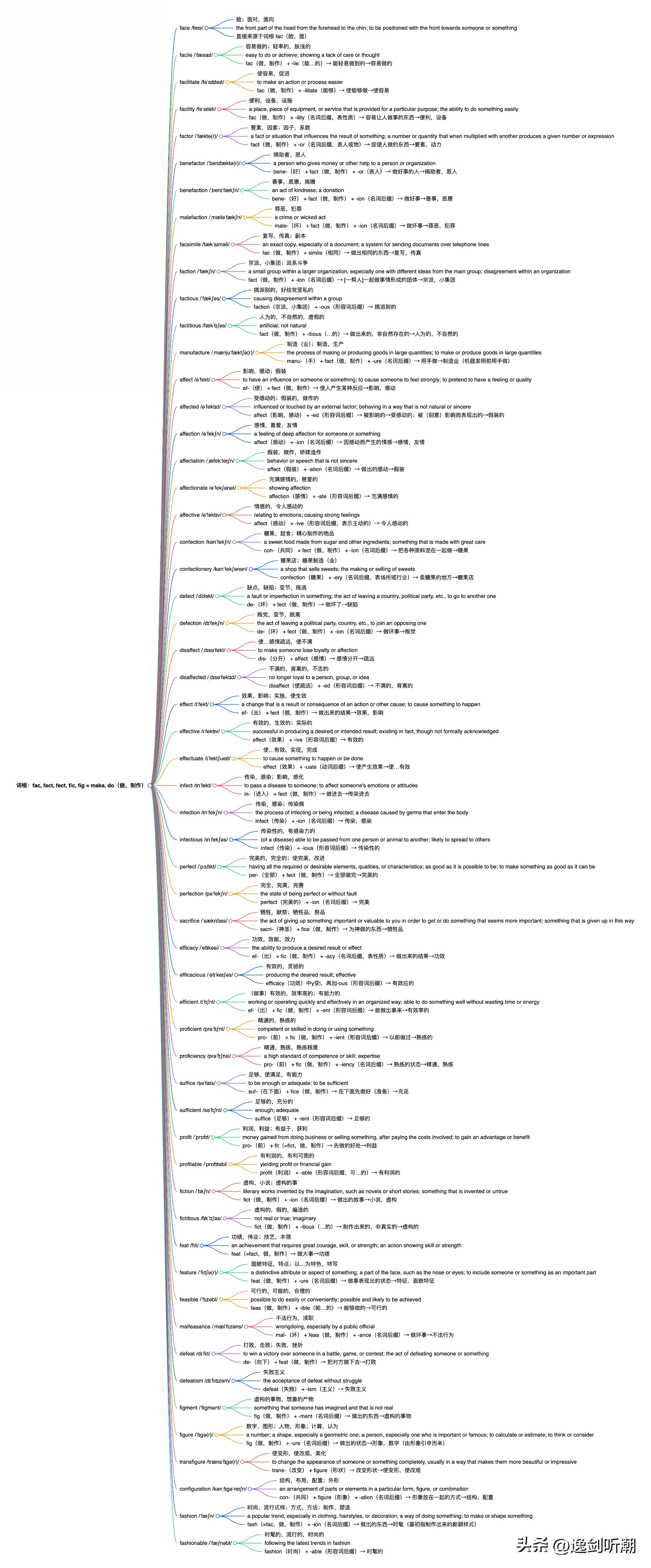fac,fact,fect,fic,fig=make,do,表示"做,制作"

- face /feɪs/
中文释义:脸;面对,面向。
英文释义:the front part of the head from the forehead to the chin; to be positioned with the front towards someone or something.
构词:直接来源于词根 fac(脸,面)。
例句:She has a beautiful face.(她有一张漂亮的脸。) / We are facing a difficult problem.(我们正面临一个难题。) - facile /ˈfæsaɪl/
中文释义:容易做的;轻率的,肤浅的。
英文释义:easy to do or achieve; showing a lack of care or thought.
构词:fac(做,制作) + -ile(能… 的)→ 能轻易做到的→容易做的。
例句:It's not a facile task to solve this problem.(解决这个问题并非易事。) / His facile remarks showed he didn't understand the issue.(他肤浅的言论表明他不了解这个问题。) - facilitate /fəˈsɪlɪteɪt/
中文释义:使容易,促进。
英文释义:to make an action or process easier.
构词:fac(做,制作) + -ilitate(能够)→ 使能够做→使容易。
例句:The new software will facilitate our work.(这款新软件将方便我们的工作。) - facility /fəˈsɪləti/
中文释义:便利,设备,设施。
英文释义:a place, piece of equipment, or service that is provided for a particular purpose; the ability to do something easily.
构词:fac(做,制作) + -ility(名词后缀,表性质)→ 容易让人做事的东西→便利,设备。
例句:The hotel has excellent facilities.(这家酒店有很棒的设施。) / She has great facility in learning languages.(她在学习语言方面有很强的天赋。) - factor /ˈfæktə(r)/
中文释义:要素,因素;因子,系数。
英文释义:a fact or situation that influences the result of something; a number or quantity that when multiplied with another produces a given number or expression.
构词:fact(做,制作) + -or(名词后缀,表人或物)→ 促使人做的东西→要素,动力。
例句:Exercise is an important factor in maintaining good health.(锻炼是保持健康的重要因素。) - benefactor /ˈbenɪfæktə(r)/
中文释义:捐助者,恩人。
英文释义:a person who gives money or other help to a person or organization.
构词:bene-(好) + fact(做,制作) + -or(表人)→ 做好事的人→捐助者,恩人。
例句:The university received a large donation from an anonymous benefactor.(这所大学收到了一位匿名捐赠者的大笔捐款。) - benefaction /ˌbenɪˈfækʃn/
中文释义:善事,恩惠,捐赠。
英文释义:an act of kindness; a donation.
构词:bene-(好) + fact(做,制作) + -ion(名词后缀)→ 做好事→善事,恩惠。
例句:His benefactions to the poor are well-known.(他对穷人的善举是众所周知的。) - malefaction /ˌmæləˈfækʃn/
中文释义:罪恶,犯罪。
英文释义:a crime or wicked act.
构词:male-(坏) + fact(做,制作) + -ion(名词后缀)→ 做坏事→罪恶,犯罪。
例句:The court punished him for his malefactions.(法庭因他的罪行惩罚了他。) - facsimile /fækˈsɪməli/
中文释义:复写,传真;副本。
英文释义:an exact copy, especially of a document; a system for sending documents over telephone lines.
构词:fac(做,制作) + simile(相同)→ 做出相同的东西→复写,传真。
例句:Please send me a facsimile of the contract.(请给我发一份合同的传真。) - faction /ˈfækʃn/
中文释义:宗派,小集团;派系斗争。
英文释义:a small group within a larger organization, especially one with different ideas from the main group; disagreement within an organization.
构词:fact(做,制作) + -ion(名词后缀)→ 一起做事情形成的团体→宗派,小集团。
例句:There are several factions within the political party.(这个政党内部有几个派系。) - factious /ˈfækʃəs/
中文释义:搞派别的,好结党营私的。
英文释义:causing disagreement within a group.
构词:faction(宗派,小集团) + -ous(形容词后缀)→ 搞派别的。
例句:His factious behavior caused pision in the team.(他搞派别的行为在团队中引起了分裂。) - factitious /fækˈtɪʃəs/
中文释义:人为的,不自然的,虚假的。
英文释义:artificial; not natural.
构词:fact(做,制作) + -itious(… 的)→ 做出来的,非自然存在的→人为的,不自然的。
例句:Her smile looked factitious.(她的微笑看起来很假。) - manufacture /ˌmænjuˈfæktʃə(r)/
中文释义:制造(业);制造,生产。
英文释义:the process of making or producing goods in large quantities; to make or produce goods in large quantities.
构词:manu-(手) + fact(做,制作) + -ure(名词后缀)→ 用手做→制造业(机器发明前用手做)。
例句:The company specializes in the manufacture of car parts.(这家公司专门制造汽车零部件。) - affect /əˈfekt/
中文释义:影响,感动;假装。
英文释义:to have an influence on someone or something; to cause someone to feel strongly; to pretend to have a feeling or quality.
构词:af-(使) + fect(做,制作)→ 使人产生某种反应→影响,感动。
例句:The bad weather affected our plans.(坏天气影响了我们的计划。) / She affected sadness when she heard the news.(她听到这个消息时假装很伤心。) - affected /əˈfektɪd/
中文释义:受感动的;假装的,做作的。
英文释义:influenced or touched by an external factor; behaving in a way that is not natural or sincere.
构词:affect(影响,感动) + -ed(形容词后缀)→ 被影响的→受感动的;被(刻意)影响而表现出的→假装的。
例句:The affected families received help from the community.(受影响的家庭得到了社区的帮助。) / Her affected accent was annoying.(她做作的口音很令人讨厌。) - affection /əˈfekʃn/
中文释义:感情,喜爱,友情。
英文释义:a feeling of deep affection for someone or something.
构词:affect(感动) + -ion(名词后缀)→ 因感动而产生的情感→感情,友情。
例句:She has a great affection for her hometown.(她非常热爱自己的家乡。) - affectation /ˌæfekˈteɪʃn/
中文释义:假装,做作,矫揉造作。
英文释义:behavior or speech that is not sincere.
构词:affect(假装) + -ation(名词后缀)→ 做出的感动→假装。
例句:Her affectation of shyness didn't fool anyone.(她假装害羞骗不了任何人。) - affectionate /əˈfekʃənət/
中文释义:充满感情的,慈爱的。
英文释义:showing affection.
构词:affection(感情) + -ate(形容词后缀)→ 充满感情的。
例句:The couple shared an affectionate embrace.(这对夫妇深情地拥抱在一起。) - affective /əˈfektɪv/
中文释义:情感的,令人感动的。
英文释义:relating to emotions; causing strong feelings.
构词:affect(感动) + -ive(形容词后缀,表示主动的)→ 令人感动的。
例句:Music has a strong affective impact on people.(音乐对人有强烈的情感影响。) - confection /kənˈfekʃn/
中文释义:糖果,甜食;精心制作的物品。
英文释义:a sweet food made from sugar and other ingredients; something that is made with great care.
构词:con-(共同) + fect(做,制作) + -ion(名词后缀)→ 把各种原料混在一起做→糖果。
例句:The shop sells a variety of delicious confections.(这家商店出售各种美味的糖果。) - confectionery /kənˈfekʃənəri/
中文释义:糖果店;糖果制造(业)。
英文释义:a shop that sells sweets; the making or selling of sweets.
构词:confection(糖果) + -ery(名词后缀,表场所或行业)→ 卖糖果的地方→糖果店。
例句:We bought some chocolates at the confectionery.(我们在糖果店买了一些巧克力。) - defect /ˈdiːfekt/
中文释义:缺点,缺陷;变节,叛逃。
英文释义:a fault or imperfection in something; the act of leaving a country, political party, etc., to go to another one.
构词:de-(坏) + fect(做,制作)→ 做坏了→缺陷。
例句:The car has a few minor defects.(这辆车有一些小缺陷。) / He was accused of defecting to the enemy.(他被指控叛逃到敌方。) - defection /dɪˈfekʃn/
中文释义:叛党,变节,脱离。
英文释义:the act of leaving a political party, country, etc., to join an opposing one.
构词:de-(坏) + fect(做,制作) + -ion(名词后缀)→ 做坏事→叛党。
例句:His defection was a blow to the party.(他的叛党对该党是一个打击。) - disaffect /ˌdɪsəˈfekt/
中文释义:使… 感情疏远,使不满。
英文释义:to make someone lose loyalty or affection.
构词:dis-(分开) + affect(感情)→ 感情分开→疏远。
例句:The government's policies have disaffected many voters.(政府的政策使许多选民不满。) - disaffected /ˌdɪsəˈfektɪd/
中文释义:不满的,背离的,不忠的。
英文释义:no longer loyal to a person, group, or idea.
构词:disaffect(使疏远) + -ed(形容词后缀)→ 不满的,背离的。
例句:Disaffected members of the party formed a new group.(该党的不满成员组成了一个新团体。) - effect /ɪˈfekt/
中文释义:效果,影响;实施,使生效。
英文释义:a change that is a result or consequence of an action or other cause; to cause something to happen.
构词:ef-(出) + fect(做,制作)→ 做出来的结果→效果,影响。
例句:The new law will come into effect next month.(新法律将于下个月生效。) / The medicine had an immediate effect.(这药立刻就见效了。) - effective /ɪˈfektɪv/
中文释义:有效的,生效的;实际的。
英文释义:successful in producing a desired or intended result; existing in fact, though not formally acknowledged.
构词:effect(效果) + -ive(形容词后缀)→ 有效的。
例句:We need an effective solution to this problem.(我们需要一个解决这个问题的有效办法。) - effectuate /ɪˈfektʃueɪt/
中文释义:使… 有效,实现,完成。
英文释义:to cause something to happen or be done.
构词:effect(效果) + -uate(动词后缀)→ 使产生效果→使… 有效。
例句:We need to effectuate the changes as soon as possible.(我们需要尽快实现这些改变。) - infect /ɪnˈfekt/
中文释义:传染,感染;影响,感化。
英文释义:to pass a disease to someone; to affect someone's emotions or attitudes.
构词:in-(进入) + fect(做,制作)→ 做进去→传染进去。
例句:She was infected with a virus.(她感染了病毒。) / His enthusiasm infected the whole team.(他的热情感染了整个团队。) - infection /ɪnˈfekʃn/
中文释义:传染,感染;传染病。
英文释义:the process of infecting or being infected; a disease caused by germs that enter the body.
构词:infect(传染) + -ion(名词后缀)→ 传染,感染。
例句:The wound became red and swollen, showing signs of infection.(伤口红肿,有感染的迹象。) - infectious /ɪnˈfekʃəs/
中文释义:传染性的,有感染力的。
英文释义:(of a disease) able to be passed from one person or animal to another; likely to spread to others.
构词:infect(传染) + -ious(形容词后缀)→ 传染性的。
例句:Measles is an infectious disease.(麻疹是一种传染病。) / Her laughter is infectious.(她的笑声很有感染力。) - perfect /ˈpɜːfɪkt/
中文释义:完美的,完全的;使完美,改进。
英文释义:having all the required or desirable elements, qualities, or characteristics; as good as it is possible to be; to make something as good as it can be.
构词:per-(全部) + fect(做,制作)→ 全部做完→完美的。
例句:She speaks perfect English.(她英语说得很完美。) / He spent hours perfecting his speech.(他花了几个小时完善他的演讲。) - perfection /pəˈfekʃn/
中文释义:完全,完美,完善。
英文释义:the state of being perfect or without fault.
构词:perfect(完美的) + -ion(名词后缀)→ 完美。
例句:He strives for perfection in everything he does.(他做任何事都力求完美。) - sacrifice /ˈsækrɪfaɪs/
中文释义:牺牲,献祭;牺牲品,祭品。
英文释义:the act of giving up something important or valuable to you in order to get or do something that seems more important; something that is given up in this way.
构词:sacri-(神圣) + fice(做,制作)→ 为神做的东西→牺牲品。
例句:She made many sacrifices to support her family.(她为养家糊口做出了许多牺牲。) - efficacy /ˈefɪkəsi/
中文释义:功效,效能,效力。
英文释义:the ability to produce a desired result or effect.
构词:ef-(出) + fic(做,制作) + -acy(名词后缀,表性质)→ 做出来的结果→功效。
例句:The efficacy of this drug has been proven.(这种药的功效已得到证实。) - efficacious /ˌefɪˈkeɪʃəs/
中文释义:有效的,灵验的。
英文释义:producing the desired result; effective.
构词:efficacy(功效)中 y 变 i,再加 - ous(形容词后缀)→ 有效应的。
例句:This treatment is highly efficacious.(这种治疗非常有效。) - efficient /ɪˈfɪʃnt/
中文释义:(做事)有效的,效率高的;有能力的。
英文释义:working or operating quickly and effectively in an organized way; able to do something well without wasting time or energy.
构词:ef-(出) + fic(做,制作) + -ent(形容词后缀)→ 能做出事来→有效率的。
例句:She is an efficient worker.(她是个效率很高的工人。) / This new machine is more efficient than the old one.(这台新机器比旧的效率高。) - proficient /prəˈfɪʃnt/
中文释义:精通的,熟练的。
英文释义:competent or skilled in doing or using something.
构词:pro-(前) + fic(做,制作) + -ient(形容词后缀)→ 以前做过→熟练的。
例句:He is proficient in several languages.(他精通几种语言。) - proficiency /prəˈfɪʃnsi/
中文释义:精通,熟练,熟练程度。
英文释义:a high standard of competence or skill; expertise.
构词:pro-(前) + fic(做,制作) + -iency(名词后缀)→ 熟练的状态→精通,熟练。
例句:She has a high level of proficiency in English.(她英语水平很高。) - suffice /səˈfaɪs/
中文释义:足够,使满足,有能力。
英文释义:to be enough or adequate; to be sufficient.
构词:suf-(在下面) + fice(做,制作)→ 在下面先做好(准备)→充足。
例句:A light lunch will suffice.(一顿简单的午餐就够了。) - sufficient /səˈfɪʃnt/
中文释义:足够的,充分的。
英文释义:enough; adequate.
构词:suffice(足够) + -ient(形容词后缀)→ 足够的。
例句:We have sufficient evidence to prove his guilt.(我们有足够的证据证明他有罪。) - profit /ˈprɒfɪt/
中文释义:利润,利益;有益于,获利。
英文释义:money gained from doing business or selling something, after paying the costs involved; to gain an advantage or benefit.
构词:pro-(前) + fit(=fict,做,制作)→ 先做的好处→利益。
例句:The company made a large profit last year.(这家公司去年利润丰厚。) / We hope to profit from this experience.(我们希望从这次经历中获益。) - profitable /ˈprɒfɪtəbl/
中文释义:有利润的,有利可图的。
英文释义:yielding profit or financial gain.
构词:profit(利润) + -able(形容词后缀,可… 的)→ 有利润的。
例句:It's a profitable business.(这是一门有利可图的生意。) - fiction /ˈfɪkʃn/
中文释义:虚构,小说;虚构的事。
英文释义:literary works invented by the imagination, such as novels or short stories; something that is invented or untrue.
构词:fict(做,制作) + -ion(名词后缀)→ 做出的故事→小说,虚构。
例句:She enjoys reading science fiction.(她喜欢读科幻小说。) / The story is pure fiction.(这个故事纯属虚构。) - fictitious /fɪkˈtɪʃəs/
中文释义:虚构的,假的,编造的。
英文释义:not real or true; imaginary.
构词:fict(做,制作) + -itious(… 的)→ 制作出来的,非真实的→虚构的。
例句:The characters in the novel are fictitious.(小说中的人物是虚构的。) - feat /fiːt/
中文释义:功绩,伟业;技艺,本领。
英文释义:an achievement that requires great courage, skill, or strength; an action showing skill or strength.
构词:feat(=fact,做,制作)→ 做大事→功绩。
例句:Climbing Mount Everest is an amazing feat.(攀登珠穆朗玛峰是一项了不起的功绩。) - feature /ˈfiːtʃə(r)/
中文释义:面貌特征,特点;以… 为特色,特写。
英文释义:a distinctive attribute or aspect of something; a part of the face, such as the nose or eyes; to include someone or something as an important part.
构词:feat(做,制作) + -ure(名词后缀)→ 做事表现出的状态→特征,面貌特征。
例句:The main feature of the house is its large garden.(这所房子的主要特点是有一个大花园。) / The magazine features a story about the famous actor.(这本杂志以一篇关于那位著名演员的报道为特色。) - feasible /ˈfiːzəbl/
中文释义:可行的,可能的,合理的。
英文释义:possible to do easily or conveniently; possible and likely to be achieved.
构词:feas(做,制作) + -ible(能… 的)→ 能够做的→可行的。
例句:Is it feasible to finish the project by next week?(下周完成这个项目可行吗?) - malfeasance /ˌmælˈfiːzəns/
中文释义:不法行为,渎职。
英文释义:wrongdoing, especially by a public official.
构词:mal-(坏) + feas(做,制作) + -ance(名词后缀)→ 做坏事→不法行为。
例句:The official was charged with malfeasance.(这位官员被指控渎职。) - defeat /dɪˈfiːt/
中文释义:打败,击败;失败,挫折。
英文释义:to win a victory over someone in a battle, game, or contest; the act of defeating someone or something.
构词:de-(向下) + feat(做,制作)→ 把对方做下去→打败。
例句:Our team was defeated in the final.(我们队在决赛中被打败了。) / The candidate suffered a narrow defeat.(这位候选人以微弱劣势败北。) - defeatism /dɪˈfiːtɪzəm/
中文释义:失败主义。
英文释义:the acceptance of defeat without struggle.
构词:defeat(失败) + -ism(主义)→ 失败主义。
例句:His defeatism made it hard for the team to stay motivated.(他的失败主义使团队很难保持积极性。) - figment /ˈfɪɡmənt/
中文释义:虚构的事物,想象的产物。
英文释义:something that someone has imagined and that is not real.
构词:fig(做,制作) + -ment(名词后缀)→ 做出的东西→虚构的事物。
例句:The story is just a figment of his imagination.(这个故事只是他想象出来的。) - figure /ˈfɪɡə(r)/
中文释义:数字,图形;人物,形象;计算,认为。
英文释义:a number; a shape, especially a geometric one; a person, especially one who is important or famous; to calculate or estimate; to think or consider.
构词:fig(做,制作) + -ure(名词后缀)→ 做出的状态→形象,数字(由形象引申而来)。
例句:The sales figures have increased this month.(这个月的销售额增加了。) / She is a well-known figure in the art world.(她是艺术界的知名人物。) - transfigure /trænsˈfɪɡə(r)/
中文释义:使变形,使改观,美化。
英文释义:to change the appearance of someone or something completely, usually in a way that makes them more beautiful or impressive.
构词:trans-(改变) + figure(形状)→ 改变形状→使变形,使改观。
例句:The sunset transfigured the landscape.(日落使景色变得格外美丽。) - configuration /kənˌfɪɡəˈreɪʃn/
中文释义:结构,布局,配置;外形。
英文释义:an arrangement of parts or elements in a particular form, figure, or combination.
构词:con-(共同) + figure(形象) + -ation(名词后缀)→ 形象放在一起的方式→结构,配置。
例句:The configuration of the office has been changed to improve efficiency.(办公室的布局已被改变以提高效率。) - fashion /ˈfæʃn/
中文释义:时尚,流行式样;方式,方法;制作,塑造。
英文释义:a popular trend, especially in clothing, hairstyles, or decoration; a way of doing something; to make or shape something.
构词:fash(=fac,做,制作) + -ion(名词后缀)→ 做出的东西→时髦(最初指制作出来的新颖样式)。
例句:She always follows the latest fashion.(她总是紧跟最新时尚。) / He speaks in a very unique fashion.(他说话的方式很独特。) - fashionable /ˈfæʃnəbl/
中文释义:时髦的,流行的,时尚的。
英文释义:following the latest trends in fashion.
构词:fashion(时尚) + -able(形容词后缀)→ 时髦的。
例句:She likes to wear fashionable clothes.(她喜欢穿时髦的衣服。)
备注说明:
- 词根多义性:
词根 “fac, fic” 不仅表示 “做,制作”的意思,在部分单词中还与 “face(脸,面)” 相关(如 face, surface 等),记忆时需结合具体单词的含义和构词来区分。 - 词缀搭配:
注意不同词缀与词根的搭配,如 “bene-” 表示 “好”,“mal-” 表示 “坏”,“af-”“ef-”“in-”“de-” 等前缀改变单词的意义方向,有助于理解和记忆单词。 - 发音规律:
部分单词虽然同根,但发音可能因词缀或词性变化而有所不同,如 “affect” 读作 /əˈfekt/,“effect” 读作 /ɪˈfekt/,需注意区分。 - 易混淆单词:
“affect” 和 “effect” 是易混淆的一对词,“affect” 多作动词,意为 “影响,感动”;
“effect” 多作名词,意为 “效果,影响”,作动词时意为 “使生效”。
“infect”(传染)和 “affect”(影响)在含义和用法上有区别,需根据语境判断。 - 记忆技巧:
利用构词法,将单词拆分为词根、前缀和后缀,理解其构成逻辑,如 “benefactor”=“bene-(好)+ fact(做)+ -or(人)”,即 “做好事的人”→“捐助者”。
结合例句记忆单词的用法和搭配,如 “sufficient” 常与 “for” 搭配,“be sufficient for” 表示 “对… 来说足够”。将同根单词归类记忆,形成单词网络,如围绕 “fect” 记忆 “affect, effect, perfect” 等,提高记忆效率。
